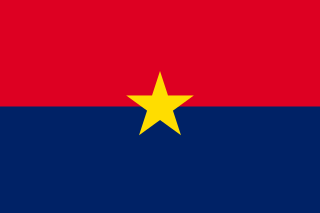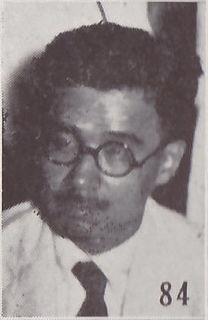Bibliography
| This article related to the military of China is a stub. You can help Wikipedia by expanding it. |
| Battle of Xuchang | |||||
|---|---|---|---|---|---|
| Part of the Central Plains War | |||||
| |||||
| Belligerents | |||||
| National Revolutionary Army 48th Division | anti-Chiang coalition | ||||
| Commanders and leaders | |||||
| Xu Yuanquan | Zhang Weixi | ||||
| Casualties and losses | |||||
| ~2,000 in total | |||||
The Battle of Xuchang was fought between the National Revolutionary Army of the Republic of China and a coalition opposing Chiang Kai-shek. Both sides were part of the Kuomintang. Chiang Kai-shek's forces attacked but failed to capture Xuchang.
| This article related to the military of China is a stub. You can help Wikipedia by expanding it. |

Yen Chia-kan, also known as C. K. Yen, was a Kuomintang politician. He succeeded Chiang Kai-shek as President of the Republic of China on 5 or 6 April 1975 and served out the remainder of Chiang's term until 20 May 1978.

Chiang Wei-kuo was a Chinese Army general, and an important figure in the Kuomintang. He is an adopted son of Republic of China President Chiang Kai-shek, adoptive brother of President Chiang Ching-kuo. His courtesy names were Jian'gao (建鎬) and Niantang (念堂).

The National Chiang Kai-shek Memorial Hall is a famous national monument, landmark and tourist attraction erected in memory of Generalissimo Chiang Kai-shek, former President of the Republic of China. It is located in Zhongzheng District, Taipei, Taiwan.
Zhongzheng or Chungcheng is a common name for places, roads, schools or organizations in Chinese-speaking areas, though today predominantly in Taiwan. The majority of these places and things are named after Chiang Chung-cheng, the preferred given name of Chiang Kai-shek. As a result, when translating into English or other non-Chinese languages, it sometimes would be replaced by "Chiang Kai-shek" instead of simply by transliteration.
The Chiang Kai-shek Memorial Song was written to commemorate the Generalissimo and late President Chiang Kai-shek of the Republic of China. There are two songs: the second song was written by Hwang Yau-tai or Huang Youdi, Huang Yu-ti (黃友棣) in 1975, who later also wrote Chiang Ching-kuo Memorial Song in 1988.

The Fujian People's Government is the common name for the People's Revolutionary Government of the Republic of China (1933–1934), also known as the Fujian People's Government, was a short-lived anti-Kuomintang government in the Chinese Republic's Fujian Province. The rebellion that led to its formation and its collapse are known as the Fujian Incident or Fujian Rebellion.

Ku Meng-yu was a politician in the Republic of China. He was the Vice Premier in 1948.
The 8th National Congress of Kuomintang was the eight national congress of Kuomintang, held on 10–23 October 1957 at Taipei, Taiwan.
The 2nd National Congress of Kuomintang was the second national congress of Kuomintang, held in 1–19 January 1926 at Kwangchow, Kwangtung, Republic of China.
The Battle of Yichang was fought in western Hubei on April 11, 1929 between the armies of Sichuan and Guangxi as part of the internal conflicts within the Kuomintang leading up to the Central Plains War. Both Liu Xiang and the new Guangxi clique were nominally independent from Chiang Kai-shek's authority despite their nominal affiliation with the Kuomintang.
The Battle of Nanning was fought between the invading Yunnan Army, allied to Chiang Kai-shek's faction, and the defending forces of the New Guangxi clique.
The Second Battle of Guilin was fought between the invading Hunan Army, allied to the forces of Chiang Kai-shek, and the forces of the New Guangxi clique personally commanded by Li Zongren. Li was facing a second invasion by the forces of the Yunnan Army targeted at Nanning. Li was forced to withdraw his forces from Guilin.
The Battle of Eastern Henan was between the Central Army of Chiang Kai-shek and those of Sun Dianying, a Henan native and ally of Feng Yuxiang and Yan Xishan. Sun's forces attacked the Longhai railway line, a stronghold on the eastern provincial border of Henan. The railway linked the cities of Kaifeng, Zhengzhou and Luoyang.
The Battle of Xinzheng was fought between the forces of Chiang Kai-shek and Feng Yuxiang. Feng's army abandoned the neighboring city of Zhengzhou as a result. The 11th Division of the National Revolutionary Army was the first to enter the city, followed by the 47th Division and 48th Division.
The Battle of Mi County was fought at Xinmi, near Zhengzhou between forces supporting Chiang Kai-shek and those opposing him.
The Battle of Shangcai was fought between the National Revolutionary Army and a coalition opposing Chiang Kai-shek. Both sides were part of the Kuomintang.
The Battle of Guanghua was fought between the National Revolutionary Army of Chiang Kai-shek and the Guominjun of Feng Yuxiang. Both sides were part of the Kuomintang.

The 715 Incident, known by the Communist Party of China (CPC) as the 715 counter-revolutionary coup, and as the Wuhan–Communist split by the Kuomintang (KMT), occurred on 15 July 1927. Following growing strains in the coalition between the KMT government in Wuhan and the CPC, and under pressure from the rival nationalist government led by Chiang Kai-shek in Nanjing, Wuhan leader Wang Jingwei ordered a purge of communists from his government in July 1927.

The Office of the President is an organ of the Republic of China (Taiwan) that handles the general administrative affairs of the President and the Vice President. The office, together with the National Security Council, serve as the two advisory agencies to the President.
The Battle of Heishiguan took place from October 26 to November 30, 1929. The location was in the northern part of Henan, China. It was one of the civil war battles that took place inside the National Revolutionary Army. The warring sides of the battle at Heishiguan, one side was Liu Xing and Ji Hao's Division of the 51 Division of Chiang Kai-shek, and the other was Peng Bingxun's army, which supported the Northwest Army by Feng Yuxiang. The battle triggered a fierce battle between the Northwest Army and the Chinese Central Army. Participants included Northwest Army Zhang Zizhong, Sun Liangcheng, Liang Guanying, and Cheng Xinming.